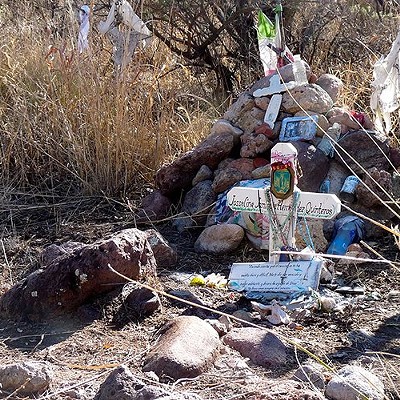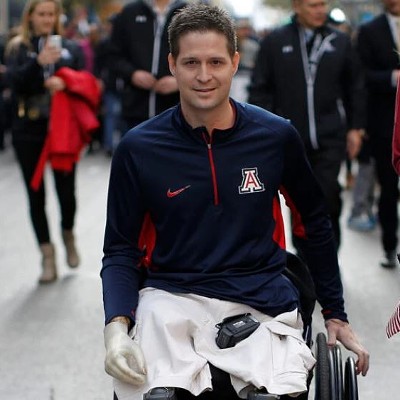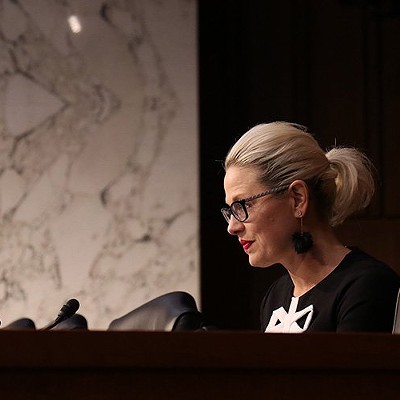It was Dec. 23, 1997, and mourning had just commenced among residents of Acteal, a high-altitude hamlet in Mexico's far-southern state of Chiapas. A day earlier, one group of dirt-poor Indians had massacred another group of dirt-poor Indians.
This bloodshed occurred amid a short-lived rebellion by the Zapatista National Liberation Army, led by the charismatic, ski-masked Subcomandante Marcos. It's thought that the violence was likewise sectarian; the victims were Zapatista supporters, while their attackers opposed the rebels.
Eventually, it was revealed that the government had been warned about the potential attack, did nothing to stop it, and later meddled with the crime scene.
At the time of the killings, Delle McCormick was a missionary in Mexico with the United Church of Christ. Today, the Rev. Delle McCormick is finishing a five-year stint as executive director of the Tucson-based BorderLinks organization.
She says the forces driving the brutality in Chiapas and the forces driving the savagery on our own border with Mexico link back to the same source: poor people pitted against other poor people, by a system that feeds on keeping them down.
The result is constant conflict, which makes life hell for inhabitants. But it also takes a toll on volunteer groups such as BorderLinks. "The border is a really hard reality to work in," says McCormick. "It's a low-intensity war zone. It's absolutely meant to crush peoples' spirits—and it does."
BorderLinks has long worked to break that cycle by running a Nogales, Sonora, women's cooperative, job-training center and children's-food program. But its core approach is taking "delegations" of Americans and others into Mexico, where participants learn firsthand about the culture and complexity of life across the line.
McCormick succeeded BorderLinks founder Rick Ufford-Chase, who later served as moderator of the Presbyterian Church. Ufford-Chase now heads the Presbyterian Peace Fellowship, which supports peace activism within the church.
Making her own imprint on the organization was sometimes painful, as the Nogales center was transferred to the control of its Mexican managers, and the BorderLinks staff shrank from 35 to less than 10. Some observers have questioned those staff reductions and the departure of key personnel.
Indeed, McCormick may have maneuvered herself out of a job; reduced staff levels made her executive director position somewhat untenable, as the cash-strapped organization struggled to pay her salary.
However, most applaud her tenure at BorderLinks. Among them is the Rev. Ken Kennon, co-president of the organization's board of directors. "We have an extremely dedicated and professional staff these days," he says. "I don't think we've ever had a better situation, and Delle really helped us get into this position."
That's high praise from a group tracing its roots back to the 1980s Sanctuary Movement, which sheltered refugees from war-torn Central America. Years later, BorderLinks is venerated for taking delegations out of their "comfort zones" and into foreign places, ranging from Copper Canyon and Chiapas to just across the border in Sonora. Recently, the organization also began offering programs that traverse the borders in our own country. One new program in Chicago, for instance, introduces participants to immigration- and policy-reform advocates, as well as immigrants themselves.
Kennon, an original Sanctuary activist, says adaptability has been vital to BorderLinks' survival. "We keep reinventing ourselves. If you have a tradition of (doing) that, you're not caught off-guard as things are always changing. When things get tough, we just get creative and say, 'All right, how are we going to do it now?'"
Under McCormick, BorderLinks has refocused on its original mission of helping outsiders understand the border region's unique dynamics and culture. In that role, success is measured more by opened eyes than full bellies—with the understanding that both are inextricably linked.
Among the devotees is UA law professor Andy Silverman. For nearly 20 years, Silverman has taken his students on day-long BorderLinks trips, where they meet directly with immigrants, officials and border residents. "I think it's important," he says, "particularly for those who are studying immigration law. But it's also important for law students in general to get a sense of the border.
"It's an eye-opening experience. For many students, the border has just been a place where you shop, or where you eat. But this gives them a chance to really experience it. And BorderLinks, with their ties and staff on both sides, makes all the difference in the world."
But can they continue to do so, as the group enters what Kennon calls a "period of transition"? Absolutely, says McCormick, who argues that changes she made will provide long-term, progressive stability. "I had a lot of work to do to help BorderLinks grow up. And I had to take some positions that were really good for the organization, but not particularly popular.
"When I came in, they didn't have a budget or staff evaluations. The highest-paid, most-powerful jobs were all held by men. We're much more diverse now. We have more women. We not an all-white, young, college-educated staff anymore."
She also drew fire for loosening BorderLinks' grip on the Sonoran center. But she calls that the only economically feasible—and ultimately ethical—option. "My experience of living and working in Mexico is that Mexicans are very, very capable of doing a fine job themselves. And I'm not comfortable with a paternalistic model of us giving all the money and doing all the directing, so then we can say, 'Oh, look at this nice project we have in Mexico—those people really need our help.'
"What I found is that we had some really competent people there who wanted to have their autonomy," McCormick says. "They still needed some tools and resources. But what they didn't need is for us to continue handing them $300,000 a year, which is what we were doing."
Setting the center on its own course also allowed BorderLinks to return to its primary mission. "Education, bottom-line, is what we do," she says. "We call it 'raising awareness and inspiring action on both sides of the border.'"
At no time in recent history has the need for such education been more critical, she says, considering Arizona's draconian immigration laws and increasing numbers of troops being dispatched to the border. "We want to create a dialogue between north and south. But I always tell those who come on our delegations that dialogue between people made poor, and people of power and privilege, means that the people with power and privilege do the listening.
"That's real dialogue," she says.












